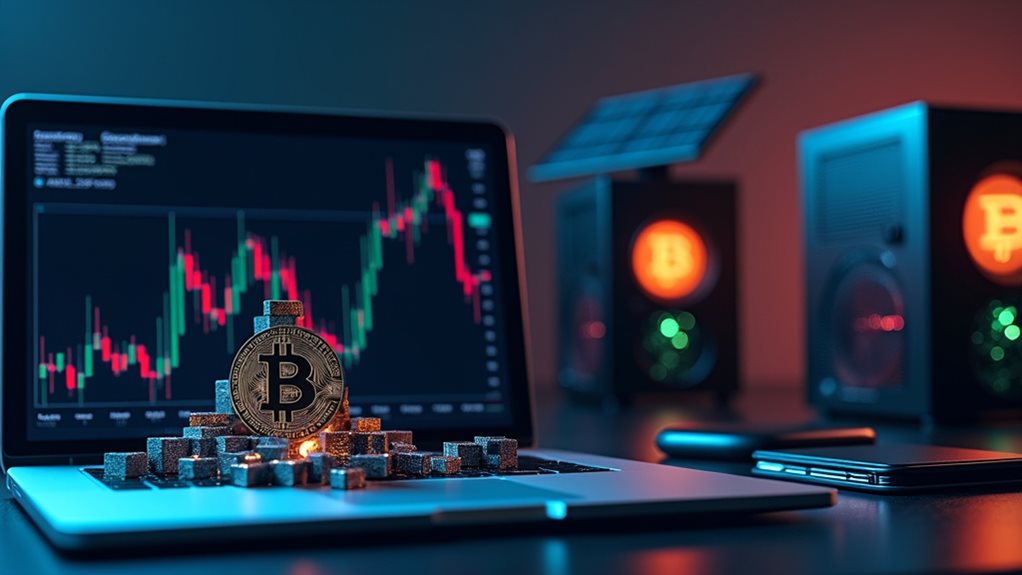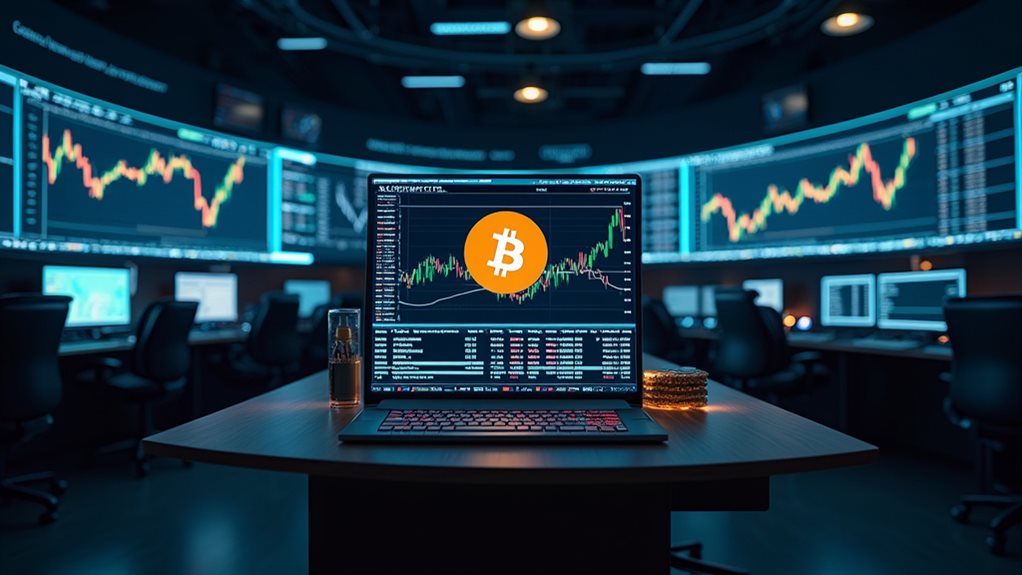Bitcoin dominates digital money in 2025, with over 100,000 websites accepting the cryptocurrency. Price predictions hover around $85,000, though volatility remains a constant companion. The IRS now tracks wallets individually, making tax season interesting for crypto holders. Mining operations are going green, while platforms like the Lightning Network boost transaction speeds. From pizza money to digital gold, Bitcoin's transformed how we view currency. There's more to this crypto story than meets the digital eye.

The wild ride of Bitcoin continues into 2025. This digital currency, born from the desire to ditch banks and middlemen, has transformed from a crypto-anarchist's dream into something your grandmother probably asks about at Sunday dinner. It's still the same decentralized system it always was – running on blockchain technology, secured by complex cryptography, and limited to that magic number of 21 million coins.
Numbers don't lie, and Bitcoin's are getting interesting. Predictions put the price around $85,000 to $88,508.13 in 2025, with estimates climbing to $112,961.30 by 2030. Sure, it's volatile – that's just Bitcoin being Bitcoin. One day you're up, the next day you're wondering why you didn't sell. Welcome to the crypto casino. With a staggering 35,224.96% return over the past decade, Bitcoin has proven itself as the best-performing asset class. The cryptocurrency's historic performance shows a remarkable 127% CAGR since its inception in 2008.
The real story isn't just about price tags. Over 100,000 websites now accept Bitcoin for payments. Cross-border transfers? Easy. Inflation protection? That's the plan, thanks to that fixed supply cap. It's like digital gold, minus the storage headaches and security guards. Bitcoin Pizza Day marked the first real-world transaction when two pizzas cost 10,000 BTC in 2010.
Speaking of headaches, the IRS is getting serious in 2025. New wallet-by-wallet tracking requirements are coming, along with that shiny new Form 1099-DA. Exchanges are scrambling to figure out how to report cost basis when crypto moves between wallets. Fun times for accountants. Just remember that lost or stolen bitcoin can't be claimed as a tax deduction anymore.
But it's not all moonshots and tax forms. Bitcoin's energy consumption is still a hot topic. Mining operations gulp electricity like teenagers raid refrigerators. Some miners are going green with renewable energy, while others stick to whatever's cheapest. Meanwhile, the Lightning Network is trying to make transactions faster and more efficient.
Trading has evolved too. Whether it's mainstream exchanges like Binance and Coinbase or decentralized platforms like Uniswap, there's no shortage of ways to buy and sell. Each comes with its own set of fees and features – some more painful than others.
The big picture? Bitcoin's not going anywhere. It's become part of the global financial landscape, whether traditional bankers like it or not. Institutions are buying in, regular folks are getting curious, and the technology keeps evolving.
Sure, it's still a roller coaster – but now it's a roller coaster with better safety features and more comfortable seats. Just don't forget your seatbelt. This ride isn't over yet.
Frequently Asked Questions
Can I Recover My Bitcoin if I Lose My Digital Wallet Password?
Recovering lost Bitcoin wallet passwords is possible but tricky. Success rates hover around 2.5% – not great odds.
Professional services exist, using specialized tools like btcrecover.py to crack passwords.
Hardware wallets? Different story – they need seed phrases.
Some folks use brute force methods like John the Ripper, but that's a long shot.
Bottom line: once that password's gone, those precious coins might be locked away forever.
How Do Bitcoin Transaction Fees Compare to Traditional Banking Fees?
Bitcoin transaction fees are all over the place – they fluctuate based on network traffic, unlike traditional banking's predictable fixed fees.
Currently around $0.57 per transaction, Bitcoin fees have jumped from previous lows to about $1.40 in early 2025.
Traditional banks charge set amounts regardless of transaction size.
Here's the kicker: while bank fees stay steady, Bitcoin fees spike during busy times.
No network congestion headaches with old-school banking.
What Happens to My Bitcoin Investments if the Internet Goes Down?
Relax. Your Bitcoin isn't going anywhere during an internet outage.
The blockchain stays intact, and offline storage methods keep investments secure. Short outages? No big deal.
Long-term blackouts are trickier, but alternative systems like satellites and mesh networks can keep transactions flowing.
Think of it like a temporary pause button – nothing's lost, just temporarily inaccessible.
Bitcoin's decentralized nature means it survives even when the internet hiccups.
Are Bitcoin Mining Rewards Worth the Energy Consumption Costs?
Mining profitability varies dramatically by location.
In Iran, where electricity costs $1,324 per Bitcoin, miners can turn a sweet profit.
But Irish miners? They're burning through $321,112 per coin – ouch.
The math is brutal. Some miners stay afloat through transaction fees and dirt-cheap energy deals.
Others are straight-up losing money.
With 6.4 million kWh needed per Bitcoin (enough to power 61 homes annually), the energy game isn't for the faint of heart.
Can Governments Legally Seize or Freeze Bitcoin Assets?
Yes, governments can legally seize Bitcoin. Law enforcement agencies routinely confiscate crypto assets linked to crimes through asset forfeiture laws. They need probable cause and proper warrants, though.
Getting the private keys? That's where it gets interesting. Sometimes criminals just hand them over (not the brightest bunch). Other times, agencies work with exchanges or use forensic tools to trace and freeze funds.
The U.S. Marshals even auction off seized Bitcoin.









